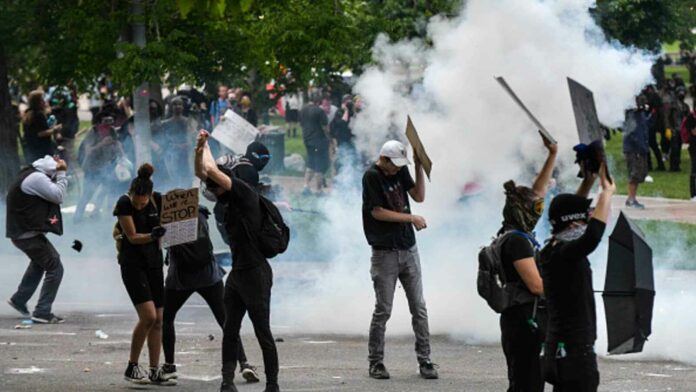The arrest of the human rights activist, Rania Al-Amdouni, after her participation in a protest in the capital, calling for the release of detainees during the recent night movements, sparked fears of the return of the practices of the former regime, and the intrusion of the security establishment, at the expense of the suppression of freedoms that brought about the freedom revolution in Tunisia.
Today, Thursday, February 4, 2021, the District Court in Tunis ruled the conviction of the human rights activist, Rania Al-Amdouni, to 6 months in prison with urgent execution, according to what was confirmed to “JDD”, Executive Director of the Rights and Freedoms Observatory, Marwan Jeddah.
The arrested human rights activist participated in the recent series of protests in the capital recently, calling for the release of young people arrested during the night movements that the country witnessed, simultaneously in various quarters coinciding with the tenth anniversary of the January 14, 2021 revolution, which in turn witnessed quarrels between security personnel and the protesting youth who He sprayed the security units with colored paint in a symbolic protest movement.
Charge ready for all
With the continuation of these practices, the Tunisian street fears a return to oppression and dictatorship that had absented rights and freedoms for 23 years in which Tunisian society lived through injustice and harassment, and in which protests were strictly prohibited. “So digesting the side of a public official” which is considered a ready-made accusation, for all citizens gives the security forces the power to control the charges and judgments, and also makes their testimony above all according to Marwan Jeddah, who considered that directing these charges to people is not appropriate for Tunisia ten years after the revolution against dictatorship, considering that this represents a return to practices of repression. The main reason for the security forces’ incursion is mainly due to the policy of impunity. In every similar incident, accountability does not occur and investigations remain open without being decided upon, according to our interlocutor.
Fabrication of charges
For her part, the human rights activist, Maryam al-Bribri, said in a statement to the “JDD” that the practices of the police state have not stopped at all since the revolution, indicating that this issue is related to adopting a new method, a “tactic” and a “political game” to impose power, and indicated that the problem today is mainly in the fabrication of the charges, which she described as “trivial”.
The spokeswoman indicated that Rania al-Amdouni is subjected to verbal and moral assault and bullying on a daily basis, which prompted her to go to one of the police stations in the capital to file a complaint against security forces to find herself arrested and accused of “speaking out against modesty” and “assaulting good morals,” and hence a prison deposit card is issued for her, although these are not considered serious crimes that require suspension at her discretion.
An arm of the authorities and political parties
Al-Bribri revealed that the violent attacks that affected protesters and human rights activists have worsened today, 10 years after the revolution, as a result of the security establishment’s rejection of the recent protests and their forms and considering the protest movements as an insult to them, which was especially clear after the protests rejecting the law against attacks on armed forces.
The spokeswoman indicated that the security forces consider themselves today the ruling authority, whose orders must be obeyed, just as they consider themselves an arm of the authority, and the right-wing political parties, which was evident during the march of the Ennahda movement, which was secured by the security forces, while they dealt with human rights protests in a completely different way. Although these protests expressed the concerns of all citizens, defending the rights of everyone, as well as the security forces, while political parties took to the streets to defend their electoral legitimacy








